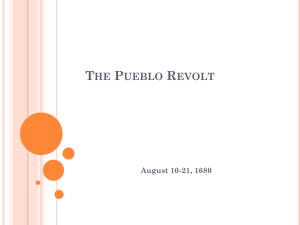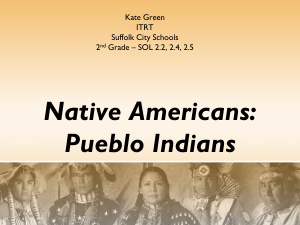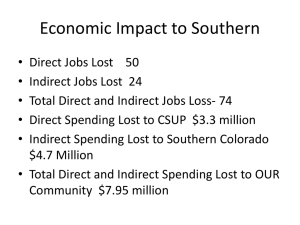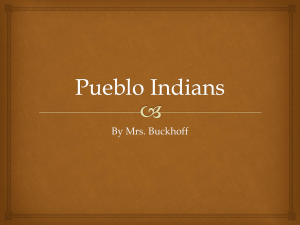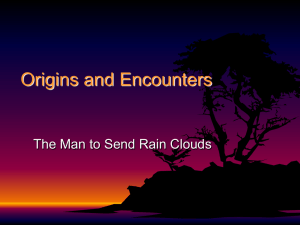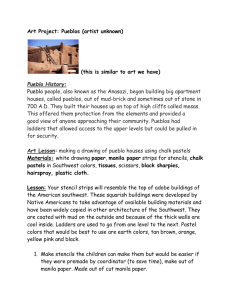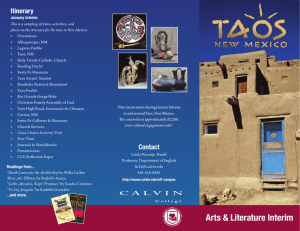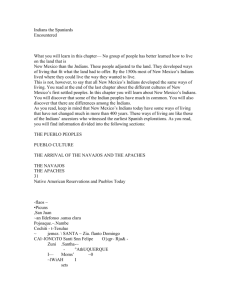"As They Had Been in Ancient Times": Pedro Naranjo Relates the
advertisement
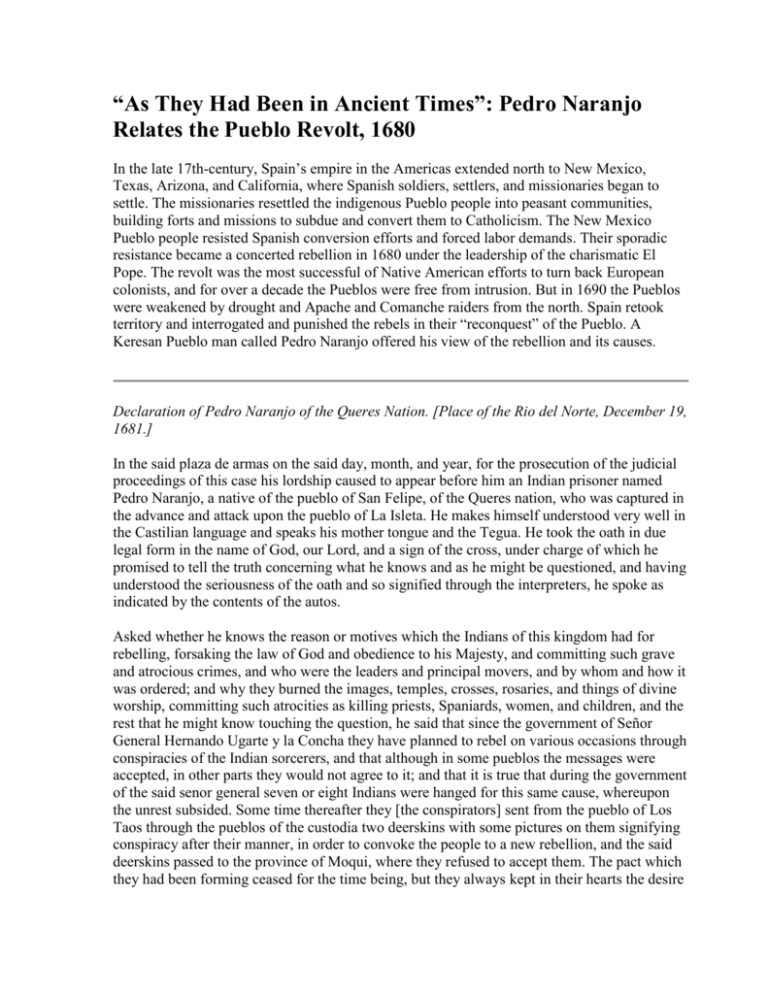
“As They Had Been in Ancient Times”: Pedro Naranjo Relates the Pueblo Revolt, 1680 In the late 17th-century, Spain’s empire in the Americas extended north to New Mexico, Texas, Arizona, and California, where Spanish soldiers, settlers, and missionaries began to settle. The missionaries resettled the indigenous Pueblo people into peasant communities, building forts and missions to subdue and convert them to Catholicism. The New Mexico Pueblo people resisted Spanish conversion efforts and forced labor demands. Their sporadic resistance became a concerted rebellion in 1680 under the leadership of the charismatic El Pope. The revolt was the most successful of Native American efforts to turn back European colonists, and for over a decade the Pueblos were free from intrusion. But in 1690 the Pueblos were weakened by drought and Apache and Comanche raiders from the north. Spain retook territory and interrogated and punished the rebels in their “reconquest” of the Pueblo. A Keresan Pueblo man called Pedro Naranjo offered his view of the rebellion and its causes. Declaration of Pedro Naranjo of the Queres Nation. [Place of the Rio del Norte, December 19, 1681.] In the said plaza de armas on the said day, month, and year, for the prosecution of the judicial proceedings of this case his lordship caused to appear before him an Indian prisoner named Pedro Naranjo, a native of the pueblo of San Felipe, of the Queres nation, who was captured in the advance and attack upon the pueblo of La Isleta. He makes himself understood very well in the Castilian language and speaks his mother tongue and the Tegua. He took the oath in due legal form in the name of God, our Lord, and a sign of the cross, under charge of which he promised to tell the truth concerning what he knows and as he might be questioned, and having understood the seriousness of the oath and so signified through the interpreters, he spoke as indicated by the contents of the autos. Asked whether he knows the reason or motives which the Indians of this kingdom had for rebelling, forsaking the law of God and obedience to his Majesty, and committing such grave and atrocious crimes, and who were the leaders and principal movers, and by whom and how it was ordered; and why they burned the images, temples, crosses, rosaries, and things of divine worship, committing such atrocities as killing priests, Spaniards, women, and children, and the rest that he might know touching the question, he said that since the government of Señor General Hernando Ugarte y la Concha they have planned to rebel on various occasions through conspiracies of the Indian sorcerers, and that although in some pueblos the messages were accepted, in other parts they would not agree to it; and that it is true that during the government of the said senor general seven or eight Indians were hanged for this same cause, whereupon the unrest subsided. Some time thereafter they [the conspirators] sent from the pueblo of Los Taos through the pueblos of the custodia two deerskins with some pictures on them signifying conspiracy after their manner, in order to convoke the people to a new rebellion, and the said deerskins passed to the province of Moqui, where they refused to accept them. The pact which they had been forming ceased for the time being, but they always kept in their hearts the desire to carry it out, so as to live as they are living today. Finally, in the past years, at the summons of an Indian named Popé who is said to have communication with the devil, it happened that in an estufa of the pueblo of Los Taos there appeared to the said Popé three figures of Indians who never came out of the estufa. They gave the said Popé to understand that they were going underground to the lake of Copala. He saw these figures emit fire from all the extremities of their bodies, and that one of them was called Caudi, another Tilini, and the other Tleume; and these three beings spoke to the said Popé, who was in hiding from the secretary, Francisco Xavier, who wished to punish him as a sorcerer. They told him to make a cord of maguey fiber and tie some knots in it which would signify the number of days that they must wait before the rebellion. He said that the cord was passed through all the pueblos of the kingdom so that the ones which agreed to it [the rebellion] might untie one knot in sign of obedience, and by the other knots they would know the days which were lacking; and this was to be done on pain of death to those who refused to agree to it. As a sign of agreement and notice of having concurred in the treason and perfidy they were to send up smoke signals to that effect in each one of the pueblos singly. The said cord was taken from pueblo to pueblo by the swiftest youths under the penalty of death if they revealed the secret. Everything being thus arranged, two days before the time set for its execution, because his lordship had learned of it and had imprisoned two Indian accomplices from the pueblo of Tesuque, it was carried out prematurely that night, because it seemed to them that they were now discovered; and they killed religious, Spaniards, women, and children. This being done, it was proclaimed in all the pueblos that everyone in common should obey the commands of their father whom they did not know, which would be given through El Caydi or El Popé. This was heard by Alonso Catití, who came to the pueblo of this declarant to say that everyone must unite to go to the villa to kill the governor and the Spaniards who had remained with him, and that he who did not obey would, on their return, be beheaded; and in fear of this they agreed to it. Finally the senor governor and those who were with him escaped from the siege, and later this declarant saw that as soon as the Spaniards had left the kingdom an order came from the said Indian, Popé, in which he commanded all the Indians to break the lands and enlarge their cultivated fields, saying that now they were as they had been in ancient times, free from the labor they had performed for the religious and the Spaniards, who could not now be alive. He said that this is the legitimate cause and the reason they had for rebelling, because they had always desired to live as they had when they came out of the lake of Copala. Thus he replies to the question. Asked for what reason they so blindly burned the images, temples, crosses, and other things of divine worship, he stated that the said Indian, Popé, came down in person, and with him El Saca and El Chato from the pueblo of Los Taos, and other captains and leaders and many people who were in his train, and he ordered in all the pueblos through which he passed that they instantly break up and burn the images of the holy Christ, the Virgin Mary and the other saints, the crosses, and everything pertaining to Christianity, and that they burn the temples, break up the bells, and separate from the wives whom God had given them in marriage and take those whom they desired. In order to take away their baptismal names, the water, and the holy oils, they were to plunge into the rivers and wash themselves with amole, which is a root native to the country, washing even their clothing, with the understanding that there would thus be taken from them the character of the holy sacraments. They did this, and also many other things which he does not recall, given to understand that this mandate had come from the Caydi and the other two who emitted fire from their extremities in the said estufa of Taos, and that they thereby returned to the state of their antiquity, as when they came from the lake of Copala; that this was the better life and the one they desired, because the God of the Spaniards was worth nothing and theirs was very strong, the Spaniard’s God being rotten wood. These things were observed and obeyed by all except some who, moved by the zeal of Christians, opposed it, and such persons the said Popé caused to be killed immediately. He saw to it that they at once erected and rebuilt their houses of idolatry which they call estufas, and made very ugly masks in imitation of the devil in order to dance the dance of the cacina; and he said likewise that the devil had given them to understand that living thus in accordance with the law of their ancestors, they would harvest a great deal of maize, many beans, a great abundance of cotton, calabashes, and very large watermelons and cantaloupes; and that they could erect their houses and enjoy abundant health and leisure. As he has said, the people were very much pleased, living at their ease in this life of their antiquity, which was the chief cause of their falling into such laxity. Following what has already been stated, in order to terrorize them further and cause them to observe the diabolical commands, there came to them a pronouncement from the three demons already described, and from El Popé, to the effect that he who might still keep in his heart a regard for the priests, the governor, and the Spaniards would be known from his unclean face and clothes, and would be punished. And he stated that the said four persons stopped at nothing to have their commands obeyed. Thus he replies to the question. Asked what arrangements and plans they had made for the contingency of the Spaniards' return, he said that what he knows concerning the question is that they were always saying they would have to fight to the death, for they do not wish to live in any other way than they are living at present; and the demons in the estufa of Taos had given them to understand that as soon as the Spaniards began to move toward this kingdom they would warn them so that they might unite, and none of them would be caught. He having been questioned further and repeatedly touching the case, he said that he has nothing more to say except that they should be always on the alert, because the said Indians were continually planning to follow the Spaniards and fight with them by night, in order to drive off the horses and catch them afoot, although they might have to follow them for many leagues. What he has said is the truth, and what happened, on the word of a Christian who confesses his guilt. He said that he has come to the pueblos through fear to lead in idolatrous dances, in which he greatly fears in his heart that he may have offended God, and that now having been absolved and returned to the fold of the church, he has spoken the truth in everything he has been asked. His declaration being read to him, he affirmed and ratified all of it. He declared himself to be eighty years of age, and he signed it with his lordship and the interpreters and assisting witnesses, before me, the secretary. ANTONIO DE OTERMÍN (rubric); PEDRO NARANJO; NICOLÁS RODRIGUEZ REY (rubric); JUAN LUCERO DE GODOY (rubric); JUAN Ruiz DE CASARES (rubric); PEDRO DE LEIVA (rubric); SEBASTÍAN DE HERRERA (rubric); JUAN DE NORIEGA GARCÍA (rubric); Luis DE GRANILLO (rubric); JUAN DE LUNA Y PADILLA (rubric). Before me, FRANCISCO XAVIER, secretary of government and war (rubric). Source: Charles Wilson Hackett, Revolt of the Pueblo Indians of New Mexico and Otermin’s Attempted Reconquest, 1680–1682 (Albuquerque: University of New Mexico, 1942), Volume 2: 245–49.
